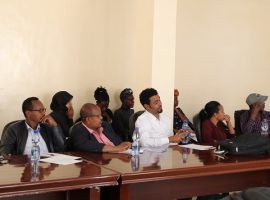Training on Measurement of Green House Gas (GHG) Emission from Livestock and Mitigation Strategies held on late March 2019 at Haramaya University main campus.
The training is channeled by the Africa Center of Excellence for Climate Smart Agriculture and Biodiversity Conservation (ACE Climate SABC) in collaboration with Ethiopian Biotechnology Institute.
Regional and national postgraduate students from ACE Climate SABC and selected faculty working on areas related to Climate Smart Livestock Production and Management attended the training.
The course was delivered by Dr. Belete Shenkute Gemeda, Assistant Professor of Animal Nutrition Department of Animal Science College of Agriculture & Environmental Science at Arsi University and Mr. Chernet Woyimo, Researcher at Ethiopian Biotechnology Institute.
Professor Nigussie Dechassa, Academic Vice president of Haramaya University and Leader of ACE Climate SABC on his opening speech remarked that there is no doubt about the importance and timeliness of this training especially for students of our center because in the short run, they need to use the techniques and technologies for their thesis/dissertation research.
A total of 28 participants attended the training of which four PhD and nine MSc students of the center including four regional MSc students. Further, four staff from College of Agriculture and Environmental Sciences, three from College of Veterinary Medicine of Haramaya University took part in the training.
There were eight external participants of which, three are staff of Ethiopian biotechnology Institute, three from Ethiopian Environment and Forestry Research Institute of Dire Dawa and one staff each from EIAR Assosa center and Oda Bultum University.
Dr. Bobe Bedadi, Deputy Leader of ACE Climate SABC on his closing remark expressed his belief that the training provided trainees with good insight into the various techniques of measurement and mitigation of GHG emissions as well as adaptation technologies to CC.
He further noted, “I have no doubt that the training has equipped you with relevant knowledge in the subject matter so as to enable you design and conduct your research with confidence and generate reliable and good quality data to make informed decisions and communicate with the scientific community.”
Dr. Bobe also called on the trainees to keep on making personal efforts to upgrade their knowledge with practical skills so that they can make use of it for fruitful purposes in the future.
Concepts of climate change, its magnitudes and impacts on livelihood and the need to mitigate GHG emission and adapt to CC, basics of methane production and its mitigation, CH4 emission and reduction/mitigation strategies, and research/ development activities in Ethiopia were some of the topics addressed by the training
Students and faculty doing their research on GHG emissions from livestock are believed to highly benefit from the training. More short courses are in the pipeline that are aimed at developing the research capacity of students, faculty and technical assistants.

